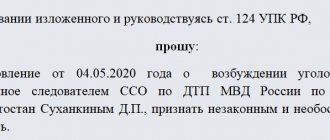1. Having suspended the preliminary investigation, the investigator notifies the victim, his representative, civil plaintiff, civil defendant or their representatives and at the same time explains to them the procedure for appealing this decision. Persons who are not suspects, accused or persons legally liable for their actions and whose property is seized are also notified of the suspension of the preliminary investigation. If the preliminary investigation is suspended on the grounds provided for in paragraphs 3 and 4 of part one of Article 208 of this Code, the suspect, the accused and his defense attorney are also notified about this.
2. After the suspension of the preliminary investigation, the investigator: 1) in the case provided for in paragraph 1 of part one of Article 208 of this Code, takes measures to identify the person to be brought in as a suspect or accused; 2) in the case provided for in paragraph 2 of part one of Article 208 of this Code, establishes the location of the suspect or accused, and if he has disappeared, takes measures to search for him.
3. After the suspension of the preliminary investigation, investigative actions are not allowed.
Commentary on Article 209 of the Code of Criminal Procedure of the Russian Federation
1. The commented article establishes an algorithm for the actions of the investigator after the suspension of the preliminary investigation. Notification of interested parties about the decision made is carried out by the investigator after a resolution has been drawn up to suspend the preliminary investigation. The article does not establish the investigator’s obligation to serve interested parties (the victim, his representative, the civil plaintiff, the civil defendant and their representatives) with copies of the resolution. Therefore, they are explained the very fact of suspension of the preliminary investigation, as well as the procedure for appealing.
2. In the cases provided for in paragraphs 1 and 2 of Part 1 of Art. 208 of the Code of Criminal Procedure of the Russian Federation, there is no real possibility of notifying the suspect, accused and his defense attorney about the suspension of the preliminary investigation. Therefore, the investigator is obliged to notify them only in the case when the preliminary investigation is suspended on the basis of paragraphs 3 and 4 of Part 1 of Art. 208 of the Code. If the preliminary investigation is suspended due to the fact that the location of the suspect or accused is known, but there is no real possibility of his participation in the criminal case, the investigator notifies the person about this by means of communication, and the defender of this person, if he is located at the place of the preliminary investigation , - in general order.
3. The decision to terminate the preliminary investigation may be appealed to the head of the investigative body (when a decision is made by the investigator) and to the prosecutor (when a decision is made by the investigator). The decision can also be appealed directly to the district court.
4. Part 2 of the commented article contains a list of measures that the investigator takes after the suspension of the preliminary investigation.
If the person to be charged as an accused has not been identified, the investigator is obliged to take all measures provided by law to identify this person. Since the investigator does not have the right to carry out investigative actions, such identification occurs in other ways (for example, by obtaining information from the body carrying out operational investigative activities in this criminal case).
If the suspect or accused has disappeared, then the investigator is obliged to take measures to search for him (Article 210 of the Code of Criminal Procedure of the Russian Federation), and if his location is not established for other reasons, then take all necessary actions to establish the location of this person (send inquiries, carry out verification actions, etc.).
5. Part 3 of the commented article establishes a categorical ban on carrying out investigative actions after the preliminary investigation has been suspended. If it is necessary to conduct them, the preliminary investigation must be resumed (clause 2, part 1, article 211 of the Code of Criminal Procedure of the Russian Federation).
Another comment on Art. 211 Criminal Procedure Code of the Russian Federation
1. After the grounds for suspending the preliminary investigation no longer exist or the need for additional investigative actions arises, the investigation is resumed by a reasoned decision of the same official who was in charge of the criminal case at the time the investigation was suspended (unless, of course, it was transferred to legal grounds to another investigator or interrogating officer).
2. The law gives the right to resume the investigation, even if the grounds for suspension have not disappeared, but there is a need to perform additional investigative actions.
3. Simultaneously with the resumption of the preliminary investigation, the prosecutor must be asked to extend the investigation period if this period has expired.
4. Proceedings in a suspended case are subject to termination upon expiration of the statute of limitations for criminal prosecution established by criminal law.
Fraud (Article 209 of the Criminal Code). Important.
lawyer Moshkin Vitaly Vitalievich, January 16, 2020 Phone: 375296252237
Minsk City Bar Association, Legal Consultation of the Sovetsky District
What is fraud? Fraud is a type of theft. According to Art. 209 of the Criminal Code, fraud is understood as the taking of property or the acquisition of rights to property through deception or abuse of trust (fraud).
Resolution of the Plenum of the Supreme Court of the Republic of Belarus No. 15 of December 21, 2001 “On the application by courts of criminal legislation in cases of theft of property” (clauses 12, 13) clarified that in case of fraud (Article 209 of the Criminal Code) the victim or other person to whom property entrusted or under the protection of which it is located, they themselves voluntarily transfer property or the right to property to the perpetrator under the influence of deception or abuse of trust.
Receipt of property under the condition of fulfilling any obligation can be qualified as fraud only if the perpetrator, even at the time of taking possession of this property, had the goal of appropriating it and did not intend to fulfill the accepted obligation.
A premeditated intention to seize property in combination with other circumstances may be evidenced by: the extremely unfavorable financial position of the person accepting the obligation at the time of concluding the contract; economic unreasonableness and unreality of accepted obligations; lack of profitable activities aimed at obtaining funds to fulfill obligations; payment of income to first investors from money contributed by subsequent investors; presentation of false documents when concluding a contract; concluding a transaction on behalf of a non-existent legal entity or registered for dummy persons, etc. In particular, if a purchase and sale transaction was concluded on the condition that an additional amount be paid to the seller, but the buyer, knowingly not intending to fulfill the promise, deceived the seller by simulating payment of the additional amount in various ways, the act is qualified as fraud.
Intentional illegal receipt of funds as pensions, benefits or other payments as a result of deception or breach of trust is also subject to qualification as theft of property by fraud.
It is important to understand that fraud, like other theft, can only be committed with direct intent, i.e. when the person (the culprit) was aware of the social danger of his action or inaction, foresaw their socially dangerous consequences and desired their occurrence.
It is also important to understand that property or the right to it is considered to be someone else’s if, at the time of taking, the perpetrator was not its owner or legally possessed. Those. it does not matter how lawfully or justifiably the property or property rights encroached upon by the fraudster were in the property or use of the victim, as well as whether it left his possession, etc. The decisive fact is that the property for the fraudster was not his, but someone else’s.
To qualify the crime, it does not matter the level of education of the victim, how primitive or sophisticated the deception or acts of abuse of trust were. All that matters is the intent of the fraudster himself.
It should also be noted that, by virtue of Art. 26 of the Criminal Procedure Code, fraud is a crime of public prosecution (except for Part 1 of Article 209 of the Criminal Code in relation to a close person (Part 2 of Article 26 of the Criminal Procedure Code)). Those. if the victim or other person filed an application to initiate a criminal case. case, or it was initiated for another reason, then the return of the stolen property is not grounds for termination of the criminal case (except for the cases provided for in Articles 86,88,88-1, 89 of the Criminal Code, Part 2 of Article 26 of the Criminal Procedure Code).
Fraud is committed in a variety of ways. Starting from the “old-fashioned” ones known from ancient times to, taking into account the development of technology and technology, we will conditionally call them “modern”. There are so many such forms of criminal manifestations, and they are so diverse that, I believe, it is unnecessary to give such examples or make any generalizations within the framework of one article. In any case, the above will be decisive - this is a type of theft committed by deception or abuse of trust.
What can be noted in conclusion? Be careful and prudent in your behavior. It is important to clearly understand that, according to the well-known proverb, free cheese only comes in a mousetrap.
Therefore, you should not borrow money, even if you are offered a high interest rate. You should not be fooled by attractive stories about joint business, very favorable and “exclusive conditions”, etc. etc. Do not participate in what you do not understand or what you do not possess properly (this especially applies to participation in the so-called stock and other online exchanges, etc.). You should not agree to the transfer of property under clearly dubious transactions, especially illegal ones, either without the normal economic interest of both parties, or in violation of the terms of already concluded transactions (to the wrong person, at the wrong time or in the wrong sequence, etc.) Do not trust unclear requests, do not believe that you won some kind of lottery if you did not participate in it, much less transfer any amounts to receive winnings, a certificate, etc.). Don't fuss if someone says that your loved one is in trouble, or your bank card has been hacked by a stranger. First, check the information, in modern conditions this is most often a matter of a few minutes, or at least a fairly short time, and only then take action. Keep an eye on your elderly, sick or minor loved ones. You should not trust strangers or people you barely know unreasonably. Moreover, give them your passport and other identification information. You must understand that there are a lot of means of deception, and not all scammers act “clumsily”; sometimes they build quite complex and ingenious schemes that outwardly look quite believable and respectable. Don’t rush to make any decision, and most importantly, you need to objectively make sure that there is no deception in front of you.
But what to do if you do become a victim of a scammer(s)? In this case, you should not be shy and should contact law enforcement agencies to report a crime. In addition, this can be simpler, as a rule, it saves effort and time, is significantly cheaper (no need to pay state fees, other court costs) and most importantly - more effective than demanding your money or property in civil (economic) proceedings, and in many cases In cases this is generally the only way to solve the problem.
What to do if you are groundlessly suspected or accused of fraud? In this case, active defense is best. Depending on the circumstances of the case, this usually means giving exhaustive testimony and presenting evidence of one’s innocence. In such cases, you should not behave passively. The help of a competent lawyer will be useful.
What to do if you finally backed down and actually committed fraud? In this case, if ug. the case has not yet been initiated - take measures to ensure that it is not initiated. Which? Obviously, the most effective may be the return of property that you have taken possession of. At the same time, it is best to have (receive) evidence of the return of such property. In this case, there is a real chance that, in the end, no criminal case will be initiated. If a criminal case has already been initiated, then it is better to take measures to mitigate liability. According to paragraph 11 of the Resolution of the Plenum of the Supreme Court of the Republic of Belarus dated January 26, 2002 No. 1 “On the imposition of criminal punishment by the courts”, the presence of at least one of the mitigating circumstances specified in paragraphs. 1,3 and 4 (voluntary compensation for harm) Art. 63 of the Criminal Code, indicates active repentance
the culprit. Moreover, when attracted to ug. liability for the first time, by virtue of Art. 77 of the Criminal Code, in all four parts of Art. 209 of the Criminal Code, under certain conditions, it is possible to apply a deferment of execution of punishment, and Art. 209 of the Criminal Code was subject to amnesty.
It should be understood that denying an obvious fact is a blow into the void, and it is better to take a competent and thoughtful position.
I am lawyer Vitaly Vitalievich Moshkin. Cont. tel. +375296252237, +375295625329 viber +375296252237 Sincerely, Blog Moshkin Vitaly Vitalievich







